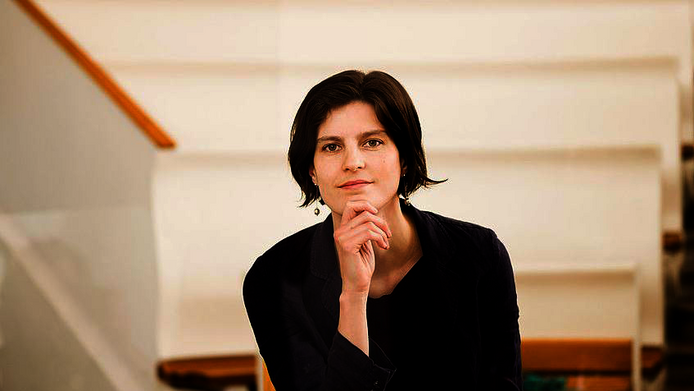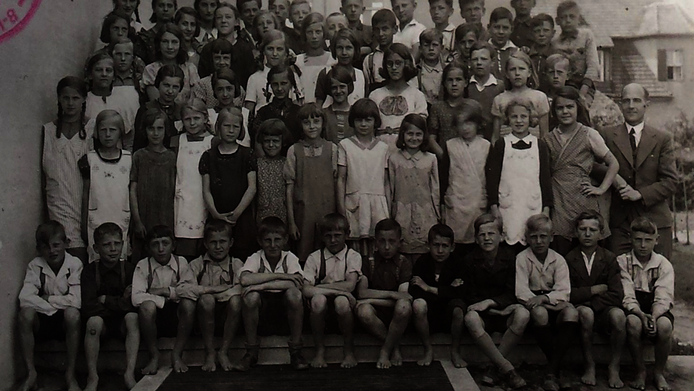Children as model citizens

Europe looks back on a century in which borders and national affiliations shifted a number of times. Funded by the Austrian Science Fund FWF, Machteld Venken's Elise Richter project examined the nationalising of children and adolescents who grew up in annexed border regions. What is new in her work is not only the focus on children, but also a time-space comparison between two border regions, namely Eupen-St. Vith-Malmedy in Belgium and Upper Silesia in Poland. Both formerly German territories, they fell to Belgium and Poland, respectively, after the First World War and then were annexed again by Germany during the Second World War. After the end of the war, they became Belgian and Polish territories once again.
Nationalising of children
The integration of the eastern cantons into Belgium and of Upper Silesia into Poland often created tensions: “Given the pro-German sentiments there, the two governments were distrustful of the populations of these regions and therefore concentrated their nationalising efforts on the young, whose political views were still malleable,” explains the historian from the University of Vienna. The initial situation was not identical in the two regions: “Founded as early as 1830, Belgium was one of the most liberal states in the world. People were able to choose both the language and the school they wanted for their children,” says Machteld Venken, describing conditions in her home country at the time. “Poland, on the other hand, did not become independent until 1918 and was shifting towards autocracy already in 1926. The country was too busy finding its own identity.”
The “border children”
Even though these two border regions were very different, the scholar was able to filter out one essential common feature: the “border children” played an important role in both societies, since they were regarded as “model citizens” of the new state. In both areas, children’s education was a central instrument for forming a sense of national affiliation: “Many teachers who had taught in the border area during the First World War were sacked after the war and replaced by teachers from deeper within the country who taught in the national language and had the mission of instilling ‘national values’,” says the historian, citing one example.
International influences, power and money
It also became apparent, however, that the nation state had only a limited influence on the border areas. On the one hand, there were international influences. “The problems at the negotiating tables in Versailles were projected onto the border regions,” says Venken. On the other hand, there were other influential factors such as power and money. When Poland became independent in 1918, the state wanted to
reduce the number of German schools in the region bordering on Germany. Language tests commissioned by the League of Nations were designed to serve as a basis for deciding which child would go to which school. In the end, there were many more registrations for German-speaking schools than there were German-speaking children. “German-speaking schools simply had higher prestige,” is the explanation Venken gives. In Poland there were also local power magnates who offered the population work and their children a place in a German-speaking school. “Money, prestige and land ownership were power factors that played a role in the border region,” notes Venken.

Population disrupts the system
Schools were a central place for the formation of national identity in both regions that the scholar investigated. “Border children” were subject to additional rules. In the Belgian-German region, for example, there was a debate about the age at which tuition in the second language should begin. “In the border region, it was supposed to start in first grade. In the rest of Belgium, language tuition commenced in the third grade and in Flanders in the fifth. Within eight years, however, that commencement shifted from the first to the fifth grade in the border region,” notes Venken and describes her discovery of another common feature: “The people took advantage of every opportunity to break up the system and change it for their benefit.” In Poland, the population also tried to increase their autonomy by founding German-speaking private schools that were less susceptible to influence from the Polish state.
Herself a child at the border
Machteld Venken’s interest in border regions appears to have been fostered by her own biography, as she grew up on the border between Belgium and the Netherlands. She remembers numerous Dutch schoolmates, children of “wealthy Dutch migrants who enjoyed tax benefits in Belgium”.
From the violin to Odessa and Vienna
Venken's path to becoming a historian involved Slavic studies but began with sheet music for the violin. In the early 1990s, her parents travelled to Russia. The books of violin sheet music they brought back for their daughter were highly appreciated by Machteld’s violin teacher and were put to use for many years. The only drawback was: they were written in Russian. Still a schoolgirl, Machteld tried to translate books with the help of dictionaries from the public library, and this was how she developed a steadily growing interest and enthusiasm for the Russian language. Finally, she decided to enrol in Slavic studies. Not exactly a mainstream decision at the time. “The Department of Slavic Studies at Leuven University was very small and its students were considered exotic creatures,” Venken recalls.
During a summer language course in Odessa in 1999, Venken got to know the country and its people better, which heightened her interest in the culture and history of Eastern Europe. The old lady with whom she stayed, for instance, told her about her life as a worker laying railway tracks through Siberia and about how she had lived in trains in the Siberian permafrost. Highly motivated, the student returned to her home university.
She describes the steep science career that followed to have been helped along by a “snowball effect”: “I improved, received a scholarship, improved again. I noticed that I was good, and I was hungry to learn more and go further,” she explains. After completing her Master's degree in Slavic Studies, the 38-year-old is now completing a Master's in European Studies in Krakow, Poland. After completing her doctorate in history at the University of Leuven, she spent three years in Warsaw as a postdoc.
In 2011 Venken finally came to Vienna with a Lise Meitner grant from the FWF. Initially at the Ludwig Boltzmann Institute for European History, later at the Institute for Eastern European History at the University of Vienna, she researched war memories and nationalising strategies in border regions. This was followed by an Elise Richter project and, finally, the Citizen- Science project Grenzen. Ein Austausch lokaler Expertisen auf globalem Level, which she completed this spring. With this programme track, the FWF supports projects appropriate in terms of content and methodology for expanding on projects already funded by the FWF through Citizen Science components. In this context, Citizen Science means above all the active involvement of citizens and their knowledge, resources and commitment in scientific research and the generation of scientific knowledge.
Borderlands Studies World Conference
When Venken organised the World Conference of the Association for Borderlands Studies, which took place in Vienna and Budapest in July 2018, some of the funding came from FWF’s Citizen Science Programme. This association of researchers who study border regions worldwide organises a world conference every four years. The 100th anniversary of the end of the Habsburg Monarchy gave Venken the opportunity to turn the conference, which was held simultaneously in both cities, into a meeting place for researchers and students studying in the territory of the former Habsburg Monarchy.
Looking back fulfils a purpose
One of the things Machteld Venken wanted to find out with her project was to what extent the Habsburg Monarchy still featured in family narratives today. While the data still has to be evaluated, there is one preliminary result: “Students from Romania, Serbia, the Ukraine and Poland, those countries that only partly belonged to the Austro-Hungarian Empire, made particularly frequent references to the Habsburg period in order to explain contemporary regional differences within their countries,” the historian explains.
Writing in Jena
Until the end of May of this year, the Belgian-born researcher commuted between Vienna, where her family lives, and Jena, where she completed her professorial qualification in book form at the Imre Kertész Kolleg, an institute for advanced studies focusing on Eastern European history of the 20th century.
Border demarcation in Brussels
Since 1 June 2019, Venken has been working on her project Bordering Brussels at the Free University of Brussels (VUB) with funds from a Belgian Citizen Science grant. The project was keyed to the jubilee year 2020, which marks the fiftieth anniversary of the signing of the first Belgian state reform. Five more reforms were to follow. Today, Belgium is a cluster of regions that have decision-making autonomy in certain areas. “The political history of the country’s border demarcation and of the city of Brussels has already been written, but I am exploring how the inhabitants perceived this demarcation process, at what points they cooperated or resisted,” the historian explains. The project is based on data from the Belgian NGO Bruxelles nous appartient, which has been sourcing oral data from citizens over the past 15 years. The historian has developed a research tool which lay people can use to analyse these data. “They may discover new research questions, for instance about where residents once perceived and now perceive borders and why these borders are important for them,” she says in describing her vision of a dynamic evolution in her Citizen Science project.
Personal details
Machteld Venken graduated in Slavic Studies, History and Economic Policy at the University of Leuven in Belgium and received a Master's degree in European Studies from the University of Krakow. She paid several research visits to Warsaw. In 2011, a Lise Meitner grant from the FWF took her to Vienna. Until mid-2018 she worked on her FWF-funded Elise Richter project at the Institute for Eastern European History at the University of Vienna. Venken organised the Association for Borderlands Studies World Conference, which took place in Vienna and Budapest in July 2018, with some of the funding coming from the FWF's Citizen Science Programme. She is currently working at the Free University of Brussels on the Citizen Science project Bordering Brussels, funded by Innoviris, a Belgian research foundation. The research of the 38-year-old historian focuses on the social and cultural history of Europe in the 19th and 20th centuries, comparative nationalism studies, comparative literature and cultural transfer, migration, border regions, the history of childhood and oral history.





